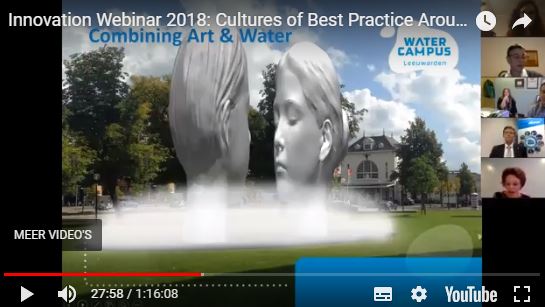Webinar participants from countries across the world – Spain, Puerto Rico, Mexico, Brazil, Ecuador, China, United Kingdom, Netherlands, USA and Australia – recently enjoyed an informative hour of inspiring accounts of city-wide collaboration related to water.
Challenges
Milwaukee and Leeuwarden are the first UN Global Compact – Cities Programme Innovating cities to tackle water and economic development challenges based on an integrated and innovative approach to water – all driven by sustained multi-sector collaboration. Both cities are leading partnership developers, shaping water-centred ‘cultures’ and best practice in their cities and building connectedness between water leaders across the globe.
Although the cities of Milwaukee and Leeuwarden are on opposite sides of the globe, there are strong synergies in the way they approach water issues and harness water technology to build economic growth. Whilst it is not possible to encompass all that has been achieved by both cities over the past decade, the following threads have been drawn from the webinar. A set of resources at the end of this article round out the story.
Water created opportunities
The webinar started with both cities acknowledging that proximity to water has shaped their communities and created opportunities for ecological, economic and social development. As stated by Evelien Walstra, Senior Advisor Economic Affairs of the Municipality of Leeuwarden:
“Water is in our DNA: water has formed our culture, our way of living – and our landscape”.
In the words of Erick Sharmbarger, Sustainability Director for the City of Milwaukee:
“Milwaukee values water … you can’t have long term sustained economic growth without having a healthy environment”.
Landmark centres to foster collaboration and innovation
One of the most inspiring actions in both cities has been the building of landmark physical spaces that house business, research and development, academia and government, fostering collaboration and innovation.
These shared spaces build the cities’ economies around water technology. They use these technologies to support the improvement of both the local environment and also provide solutions to global water challenges such as: the availability of clean water; management of storm water; and the processing of waste and polluted water.
In Milwaukee, The Global Water Center was established in 2009 and is “the driving force behind … the vibrant spirit of collaboration between public, private and academic sectors with a strong, shared commitment to finding innovative solutions to critical global water challenges”.
In Leeuwarden, WaterCampus “stimulates cooperation between (inter)national businesses, knowledge institutes and governments within the water technology sector in order to create synergy for world class innovation, education and entrepreneurship”.
Examples
Recognised as one of the world’s top 25 global water leaders, Hein Molenkamp, Director of the Water Alliance, described the role of WaterCampus in facilitating co-operation between academia, government, business and civil society. He provided examples of shared research facilities that can be rented by small innovative companies to test ideas in the applied research phase of developing innovative technologies and can call on students to support research towards the creation of marketable products. He also noted that WaterCampus has off-site research test beds working on: desalination techniques; the management of hospital waste water, municipal waste water and drinking water; and the needs of the dairy industry.
Similarly, The Global Water Center provides facilities for research and innovation in water technology as well as housing private sector organisations, universities and fostering start-ups. On a former brown field site, the Global Water Center is located close to the Reed Street Yards which has since developed into a Water Technology Business Park – an eco-industrial district incorporating green infrastructure; an exemplar of sustainable development and central to the Milwaukee ‘Water-Centric City’ framework.
The City of Milwaukee are encouraging other cities to adopt the Water-Centric City framework, you can make a pledge using this link.
Impact on the city, society and environment
Both cities foster engagement with their citizens.
Milwaukee provided the example of a large citizen science program and the one hundred different community groups that participate in activities like the water sampling program that helps monitor pollution levels in the local rivers and lakes.
Leeuwarden has developed a ‘life-long learning’ approach to engaging with students around water issues from primary school age projects to post-doctoral research.
Finally, the webinar showcased a number of wonderful environmental restoration projects that have made Milwaukee’s rivers and lakes both safer, healthier and more accessible to the community.
As Jenny Kehl, UW-Milwaukee Professor and Global Water Security Scholar, explained, the work is focused on “how to keep the water clean in the context of political uncertainty and also climate variability; (and) how to make reliable forward thinking long term decisions”.
Evelein Walstra also spoke of political struggles:
“First it was the fight against water, then the fight against water pollution… and now it is the time to work with nature and with technology to solve regional and global water issues – and to create more sustainable, more environmentally friendly and community accessible spaces that link our cities and our waters”.
We were pleased that both cities spoke positively about the role of the UN Global Compact – Cities Programme in supporting their efforts to build unique and innovative projects.
Source: website Citiesprogramme.org


